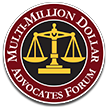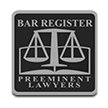Wrongful Death Legal Glossary D
Damages: Damages are awarded in various categories. Compensatory damages compensate the plaintiff for actual dollar-value losses (e.g., medical expenses, both past and future), lost income, loss of future earning capacity, etc. General damages, which are also a form of compensatory damages, cover more intangible losses, such as pain, suffering, humiliation, the loss of enjoyment of life as well as grief suffered from the loss of a loved one. Punitive damages (which are rare) serve to punish a defendant for extreme behavior and which serve to deter others from similar conduct.
Decision: The judgment rendered by a court after a consideration of the facts and legal issues before it.
Defective Product: A “defective product” is one that causes injury to a person because of some defect in the product (e.g., manufacturing defect, design defect, or inadequate warning). Product liability litigation and claims are usually more complicated than ordinary cases because of the necessity of securing experts in the field from which the product was manufactured. These experts can show alternative designs, and can demonstrate that the manufacturer could have prevented the injury, or death, by making modifications, installing safety guards, or having designed a completely different product.
Deposition: A deposition is a form of discovery in which a plaintiff, a defendant, a witness, or an expert witness with relevant information about a lawsuit is formally questioned under oath by the attorneys representing all parties in the lawsuit. The deposition is similar to the giving of oral testimony in a trial, but takes place under less formal circumstances and in advance of a trial. The deposition is typically before a court reporter and the witness is subjected to examination by attorneys for all parties.
Defendant: A person who is sued or accused in a court of law.
Design Defect: In these cases, a poor design causes injury to the person. In North Carolina, the injured person must prove that the manufacturer acted unreasonably in designing the product, that this conduct proximately caused the injury, and one of the following: the design of the product was so unreasonable that a reasonable person, aware of the facts, would not use or consume a product of this design; or the manufacturer unreasonably failed to adopt a safer, practical, feasible and otherwise reasonable design and that the better design would have prevented or substantially reduced the risk of harm without substantially impairing the usefulness, practicality or desirability of the product.
Direct Evidence: Evidence that stands on its own to prove an alleged fact.
Direct Examination: The initial questioning of a witness by the party that called the witness.
Directed Verdict: A judge’s order to a jury to return a specified verdict, usually because one of the parties failed to prove its case.
Disbursements: Expenditures of money. When lawyers charge clients for disbursements, they seek to recover costs for expenses such as photocopying, long-distance phone charges, etc.
Discovery: The use of depositions, interrogatories, requests for production of documents, requests for admissions, and demands for independent medical examinations, and other procedures to discover relevant evidence possessed by the other parties or by independent witnesses.
Dismissal with Prejudice: An order to dismiss a case in which the court bars the plaintiff from suing again on the same cause of action.
Dismissal without Prejudice: An order to dismiss a case in which the court preserves the plaintiff’s right to sue again on the same cause of action.
Dismissal: The judge may dismiss your case at motion hearing if there is evidence that your rights were violated during the stop of the vehicle, or a host of other reasons, if the evidence against you is weak. The judge can dismiss a case with prejudice, which means the DA can’t re-file the case against you, or without prejudice, which means the DA can chose to re-file and try again to convict you.
Drunk Driving: A general reference to those criminal cases that are called DUI, DWI, OUI, OWI, DUII, DWAI, or other acronyms. They generally describe two types of cases: first, where the driver is sufficiently impaired by alcohol, drugs, or a combination of the two that the driver cannot drive safely. Second, “drunk driving” relates to those cases where someone is above that state’s legal limit, usually .08, no matter how safely the person is driving.
DUI: Driving under the influence. Will either refer to driving under the influence of alcohol, driving under the influence of drugs, or driving under the influence of a combination of liquor and drugs. This is the most widely used acronym for drunken driving cases. The standard for what it means to be under the influence will vary from state to state. It is important to contact a lawyer in your area that knows DUI law if you have been accused of DUI or a related drunk driving offense.
DUII: Driving under the influence of an intoxicant. The intoxicant in DUII cases can be either alcohol or other drugs. There is no difference between a charge of DUII and DUI. A DUII charge is no more or less serious than that of DUI. However, Oregon, the state that refers to drunk driving as DUII, does have a pre-trial diversion program that many other states do not offer. Before you get involved in any diversion program, please talk to a DUI defense lawyer, as there are pros and cons to these types of programs.
Duty to Warn: The legal obligation to warn people of a danger. Typically, manufacturers of hazardous products have a duty to warn customers of a product’s potential dangers and to advise users of any precautions they should take.
DWI: Driving while intoxicated, or driving while impaired. Like DUI, DWI can refer to driving while intoxicated or impaired as the result of either drinking alcohol or taking drugs, or both. This is the second most widely used acronym for drunken driving cases. Like DUI, the question of how to define being intoxicated or impaired is at the heart of a drunken driving case in jurisdictions that use DWI. It is critical to consult with a DWI lawyer in your area that understands these sophisticated issues.
Free Case Evaluation
Verdicts & Settlements
R.J. Reynolds Tobacco Company product liability.
R.J. Reynolds Tobacco Company product liability.
Jury verdict for the wrongful death of a 63-year-old man survived by his widow.
Verdict against cigarette manufacturer for family of local lawyer who died of lung cancer.
Verdict against tobacco manufacturer for family of man who died from lung cancer as a result of smoking.
Verdict for widow of man who died of lung cancer as a result of addiction to smoking.
Gordon and Partners, along with co-counsel, recently represented the family of a smoker who passed away when she was 60 years old from lung cancer caused from her long time addiction to smoking cigarettes since she was a young girl. The case was tried in Lowell, Massachusetts and resulted in a verdict of 17 million dollars on May 31, 2019.
Recovery for man and family for injuries caused by a defective auto part.
Verdict for a smoker who contracted cancer of the jaw.
A Pinellas County jury verdict for the estate of a man who died of lung cancer at the age of 42.
Jury verdict for the wrongful death of a 68-year-old man from lung cancer from smoking cigarettes manufactured by RJR and Philip Morris.




 855-722-2552
855-722-2552